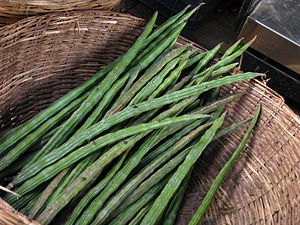Moringa

Moringa, native to parts of Africa and Asia, is the sole genus in the flowering plant family Moringaceae. The name is derived from the word Drumstick or murungai. It contains 13 species from tropical and subtropical climates that range in size from tiny herbs to massive trees. The most widely cultivated species is Moringa oleifera, a multipurpose tree native to the foothills of the Himalayas in northwestern India and cultivated throughout the tropics.
Much of the plant is edible by humans or by farm animals. The leaves are rich in protein, vitamin A, vitamin B, vitamin C, and minerals. A 100-g portion of fresh moringa leaves has 9.3 g protein, 434 mg calcium, 404 mg potassium, 738 μg vitamin A, and 164 mg vitamin C.
Feeding the high-protein leaves to cattle has been shown to increase weight gain by up to 32% and milk production by 43 to 65%. The seeds contain 30 to 40% oil that is high in oleic acid, while degreased meal is 61% protein. The defatted meal is a flocculant and can be used in water purification to settle out sediments and undesirable organisms.
Moringa oleifera; English common names include: moringa, drumstick tree (from the appearance of the long, slender, triangular seed-pods), horseradish tree (from the taste of the roots, which resembles horseradish), ben oil tree, benzoil tree or benzoyl tree (from the oil which is derived from the seeds).
References
Find recipes that contain 'Moringa'
#moringa #vitaminc #vitamina #minerals #calcium #potassium #protein #vitaminb #vegetables